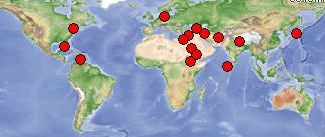
Round the world in twenty-two steps. Here's this week's collection of developments in democracy, rights, and the revolutions that carry them forward. As always, we've got some progress, some regress, and some that are just a mess.
Let's begin on the road to Damascus ...
Mustafa at Beirut Spring
finds some interesting hints at future policy in Saad Hariri's choice of whom to meet (and whom not to meet) at the U.N. this past week.
Further south along the Mediterranean coast ...
Turning to recent events in Gaza, Different River has put together
a great compendium of comment and photos on the destruction of synagogues there by "jubilant" Palestinians.
And across the border into Egypt ...
Freedom for Egyptians
draws some interesting parallels between the murder of Syria's Rafik Hariri and the assassination of Anwar Sadat nearly twenty-four years ago. The similarities in the political motivations of these killings reveal much about obstacles to democracy in the Middle East. "Both Hariri and Sadat are liberators. Hariri won Lebanon’s sovereignty and freedom and Sadat won peace. Enemies of Hariri and Sadat are the same if not the killers."
Moving down into the horn of Africa ...
Ethiopundit brings us
a fascinating look at how Ethiopia (and much of Africa, for that matter) ended up in its particular mess today. This is a work in progress, according to the authors, but well worth reading in its current draft.
And ET Wonkette at Weichegud!
gives Jimmy Carter a well-deserved thrashing for his years of helping corrupt tyrants keep Ethiopians on a steady diet of dust.
And across the Gulf of Aden ...
Jane at Armies of Liberation
thinks that the U.S. government may be about to let realpolitik cynicism screw the forces of liberal democracy in upcoming Yemeni elections. Administration officials may even be about to welcome to Washington a Yemeni official suspected of involvement in the attack on the U.S.S. Cole. Jane also notes in another post
that U.S. intelligence can no longer claim to be mystified about the origins of the Cole plot, thanks to revelations of the crack work of Able Danger.
Farther north on the peninsula ...
Captain Ed at the Captain's Quarters
sees a chink in the wall of gender apartheid in Saudi Arabia. Apparently, women will be allowed to both vote and run in upcoming local elections. Some skepticism is probably in order, but Captain Ed makes some good points in his analysis of what the Saudi royal family may be up to.
And across the Persian Gulf in the land of the Ayatollahs ...
Amil Amani writes in The American Thinker about
how the mullahs in Iran are trying to shove pre-Islamic Persian culture down the memory hole in the name of Allah.
Marching east across the Dasht-e Lut ...
Lastango at Daily Pundit offers
an excellent primer on the Afghan elections, whose results should be announced this week.
Sohrab Kabuli at Afghan Lord
covers the elections in Afghanistan with commentary and photos. The English is a little tricky here and there, but the account is worth reading. Sadly, the news is not all good.
The hard-working Gateway Pundit
reports on Taliban terrorism and U.N. hypocrisy: an election day attack on a dam in Afghanistan. Back in 2001 both the U.N. and Taliban officials protested loudly that U.S. military action might damage the dam and put thousands of lives at risk. Now that the U.S. is not the culprit, no one seems quite as concerned.
And south over the Arabian Sea to a small archipelago ...
Robert Mayer at Publius Pundit reports on
the dismal state of affairs in the Maldives, where it looks like the only positive development lately is that oppression inspires "freedom-blogging." Don't let mainstream media's complicity with "the mullah" of Male keep the truth hidden. Mayer provides a number of links to Maldive blogs.
Across India to the Himalayas ...
Paramendra Bhagat (a fellow New Yorker) at Democracy for Nepal
works on strategy for his countrymen struggling to bring democracy to their troubled nation. I'm not too familiar with Nepalese politics, but what he's proposing sounds like civil disobedience along the lines of Tiananmen, but with a clearer behind-the-protest plan for structure and change. It looks like an uphill battle, given the current three-way fight between monarchists, Maoists (yikes!), and democrats. This revolution is truly a work-in-progress, and Bhagat's blog looks to me like the best way to follow it.
And then north over China ...
Neo-neocon calls our attention to
the possible significance of Prime Minister Junichiro Koizumi's retaining power in recent polls in Japan. The comments demonstrate that there is disagreement on this topic ... well worth a look.
And across the Pacific and North America to the Big Apple ...
After last Tuesday's primary to choose their candidate for mayor,
Democrats are trying to chuck New York State's election law (Sec. 6-162) in the trash in the interest of unity. Hypocrisy isn't just for the Third World anymore.
Speaking of which, let's jet down south a thousand miles ...
Alfonso Chardy at Net for Cuba reveals that
Cubans are sailing to Florida in record numbers. (Maybe they're actually those doctors Fidel said he'd send to New Orleans.)
Vcrisis looks at
Hugo Chavez's designs on certain islands in the Netherlands Antilles. The great anti-colonialist may have dreams of a "Greater Venezuela."
And Jorge Arena at The Devil's Excrement examines
Chavez's attempts to shred Venezuela's (latest) constitution.
And on a related topic, Ironman at Political Calculations gets out the slide rule and the graph paper and provides a statistical proof for what most of us already figured:
the more governments meddle with economics, the harder it is to do business.
Over the Atlantic to Europe ...
Curzon at Coming Anarchy thinks that
the results of yesterday's elections in Germany bode ill for that nation's floundering economy.
Then skirting over the north coast of the Black Sea ...
Also at Coming Anarchy, Younghusband wonders if
Chechen terrorist leader Shamil Basayev (the proud planner of the Beslan massacre) isn't trying to spread his brand of violence all over the North Caucasus. Whether the goal is another Islamic state spanning ethnic and national boundaries or just control over the oil-pipeline routes, this kind of expansion could set the region back drastically.
And south across the Caucasus Mountains, bringing us almost back where we began ...
Oneworld Multimedia
looks at cafe culture in Armenia and sees revolution brewing. Apparently, the chatter at all levels of society there points to a growing intolerance for corruption, the lack of rule of law, and the "obscene wealth and political power of the oligarchs."
For an interesting snapshot of trends in freedom and rights around the world, check out
Maximiliano Herrera's "Freedom in the World." This week he updates his ratings of Liberia, Nicaragua, Kyrgystan, Burundi, Guinea Bissau, Lebanon, and Sudan. In Herrera's estimation, all but Nicaragua have seen recent improvements, trends toward greater political freedoms, respect for civil rights, or both.
Lastly, I'd like to direct this Carnival's readers to
a site honoring those American men and women in uniform who have given their lives to help the people of Iraq and Afghanistan in their struggles for democracy and peace.
Thanks to all those who submitted. If anyone thinks I missed a submission or wants to submit something late, please email me at tompain@mac.com. I may add an update to this post later today.
Thanks also to Will at
Willisms.com for managing the Carnival and the submissions with such efficiency. Be sure to check back in at the
Carnival of the Revolutions home base for the hosting schedule and to make submissions for future Carnivals.
UPDATE (21 September, 10:00 p.m.):
I received yesterday an email from Joshua at One Free Korea with a late submission for the Carnival. Instead of simply sending me a link to a single post of his own, Joshua seems to have done my job for me with regard to both the Koreas. He's written two paragraphs summing up the latest developments in North and South Korea, complete with links to posts (on his own blog and on others) that provide more info and analysis.
Joshua should consider hosting the Carnival of the Revolutions in the future. He has the knack. [Correction: Joshua did one
just a few weeks ago, one I missed thanks to a chance meeting between my iBook and a concrete floor. I'm about to read it. Looks impressive.] Though these two paragraphs differ stylistically from my work in this week's Carnival, they're too good to overlook. (The HTML is also not my own, and it has been copied into and out of an email, so it may look a little different from the usual Commoner Sense post, until I modify it. I will not blockquote it, though it is not my writing, since it becomes too confusing in blue with all the links.) Here it is:
South Korea
A modest backlash has
taken shape in the wake of South Korean leftists'
violent attempts to tear down a statue of General MacArthur at Inchon . . .
on September 11th. One of OneFreeKorea's unnamed sources in the House of Representatives provided him
a copy of a letter from Congress to President Roh expressing concern about the violent protests. (The Marmot has
proof that the protestors are taking some fairly vicious talking points from Pyongyang). South Korea's left-wing president, Roh Moo-Hyun,
betrayed his fear of alienating some of his hard-left voters by
letting his Foreign Minister send the response during the weekend to fly it under the media radar; One senior member of Roh's Uri party even
praised the protestors for their "deep ethnic purity." In the meantime, Roh was at the United Nations
railing against American imperialism and dodging
hundreds of protestors who denounced his support for the North Korean regime and his silence about the
horrific human rights abuses there.
North Korea
This week saw North Korea--
which proclaims itself cleansed of
racial impurity--
agree in principle to prompt denuclearization, only to
renege on its agreement the very next day. One of OneFreeKorea's sources on Capitol Hill
explains to a think tank (and the rest of us) why this was a bad deal for the United States in any event; indeed, North Korea's behavior may have helped the U.S. position far more than an agreement would have. Meanwhile, the United States appears to be finding its
voice and
direction in its thus-far-fruitless quest for a consistent policy for the likely event of a diplomatic breakdown. The story that most of the media missed is how the
seizure of high-quality North Korean-made counterfeit dollars ("supernotes") in the United States may have already
brought one Chinese bank to the brink of insolvency (more
here at NKZone, and
here).
Meanwhile, another urgent problem looms: North Korea
will soon stop accepting food aid despite the fact that the World Food Program believes that 6.5 million North Koreans--most of them in political classes the regime disfavors--depend on that food. Will a new flood of refugees or a another famine be the result (
the last one killed millions)? Thankfully, Mongolia has
quietly made room for a small number of North Korean refugees.
UPDATE (21 September, 11:21 p.m.):
Thanks, Joshua. I'm putting
One Free Korea up in my consciousness-raising links list.








